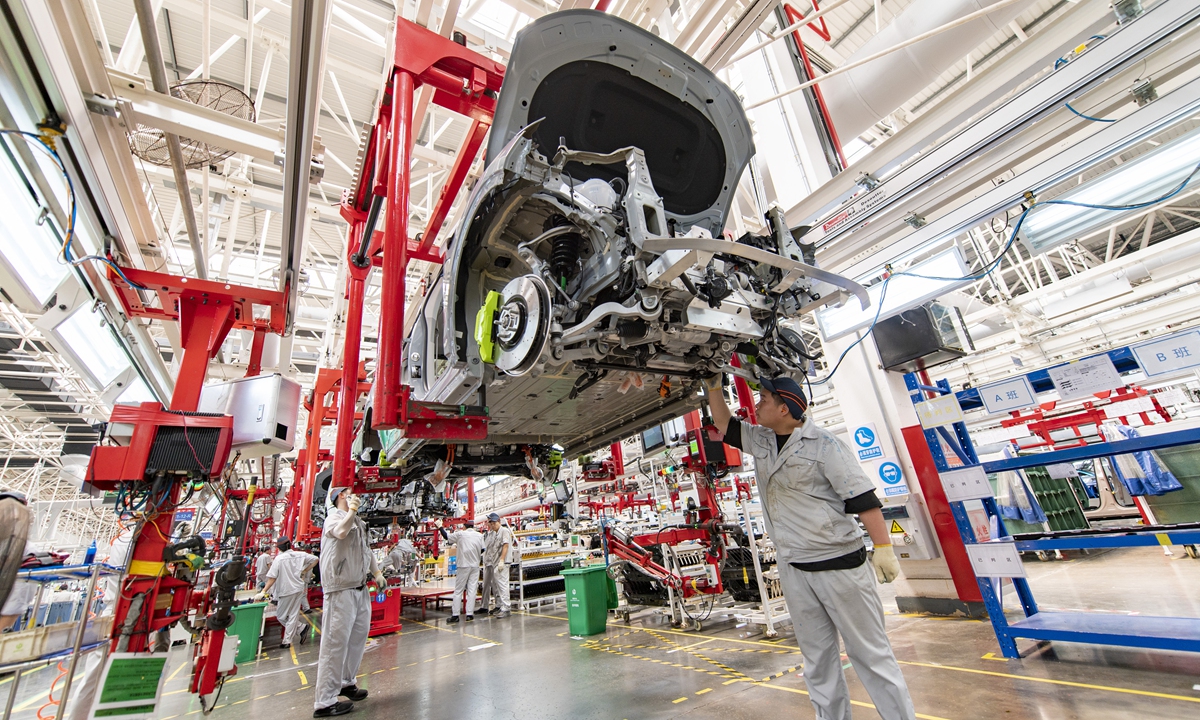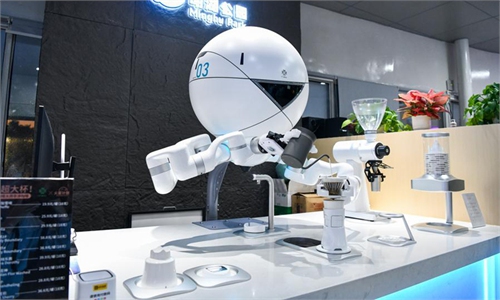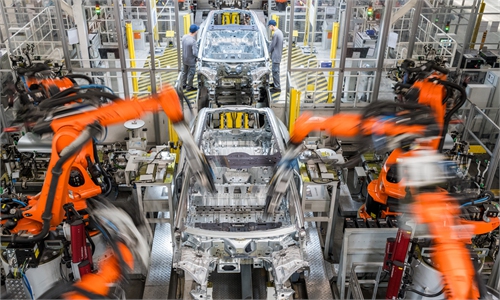
Workers are busy at a production line of new-energy vehicles (NEVs) in Jinhua, East China's Zhejiang Province on July 2, 2024. The volume of NEV production is rising driven by growing demand. Zhejiang is striving to produce more than 1.2 million NEVs annually, or more than 60 percent of the province's total automobile production, by 2025, and its NEV output will account for about 10 percent of the country's total. Photo: VCG
The China Association of Automobile Manufacturers (CAAM) issued an initiative on Saturday urging domestic new energy vehicle (NEV) companies to maintain a fair competitive order and refrain from market monopolization or product dumping.NEVs, as a prime example of China's new quality productive forces, are fueling the rapid transformation and advancement of the automotive sector. Ensuring the industry's healthy growth is vital, CAAM emphasized in a statement posted on its official WeChat account.
The association calls on all companies to strictly follow fair competition principles and operate in accordance with laws and regulations. It stresses that leading firms should not stifle other businesses or infringe on their legitimate rights in order to achieve market monopolization, as outlined in the statement.
The statement further emphasizes that, aside from legally lowering prices to clear inventory, companies should avoid selling products below cost or using deceptive advertising that misleads consumers, as these practices disrupt market order and harm the core interests of both the industry and its customers.
CAAM urges all companies to perform self-inspections and make corrections in line with relevant national laws and regulations.
In recent years, China's NEV industry has developed rapidly, with new energy vehicle sales accounting for over 40 percent of new car sales.
The industry is showing a steady and positive trend, with sustained market vitality, the statement noted. However, it also highlighted that, for some time, declining industry profitability, driven primarily by rat-race competition primarily in form of disorderly "price wars," has been a significant factor in the sector's challenges.
"Ongoing investment is essential for product after-sales service and corporate innovation, but 'price war' disrupt normal business operations, jeopardize the stability of industrial and supply chains, and pull the industry into a vicious cycle," the statement warned.
Since May 23, a certain automaker initiated significant price cuts, prompting multiple companies to follow suit, sparking fears of a new round of "price wa," CAAM's statement said.
Disorderly "price war" exacerbate vicious competition, further squeezing corporate profit margins and compromising product quality and after-sales service. This not only hampers the industry's healthy growth but also undermines consumer rights and creates safety risks, according to CAAM.
On the same day, an official from the Ministry of Industry and Information Technology (MIIT) voiced support for the CAAM's initiative, noting that the "price war" among automakers has severely disrupted normal business operations and threatens the healthy, sustainable development of the industry.
"MIIT encourages companies to lower production costs through technological and managerial innovation, thereby delivering higher-quality, cost-effective products to consumers," the official told People's Daily in response to a question about the initiative.
Disorderly "price war" is typical example of "rat-race" irrational competition, which stifles sustained R&D investment, affects product quality, performance, and service standards, and may even lead to safety risks and infringe on consumer rights, according to MIIT.
"In the long run, this erodes the industry's internal growth momentum. Put simply, 'price wars' produce no winners and no future," the official stated.
As for follow-up actions, MIIT will ramp up efforts to address "rat-race" competition in the automotive sector, promote structural optimization, enhance product consistency inspections, and work with relevant authorities to enforce anti-unfair competition regulations.
The ministry will take targeted regulatory actions to uphold a fair and orderly market environment, protect consumers' fundamental interests, and drive the high-quality development of the automotive industry.
The CAAM statement calls on the entire industry to work together to maintain a fair competitive order and promote the healthy, sustainable development of the sector.
The MIIT official also expressed hope that companies will uphold integrity and innovation, prioritize quality, and focus on technological advancements to improve product quality, elevate service standards, fulfill social responsibilities, and strengthen brand reputation.
Global Times



